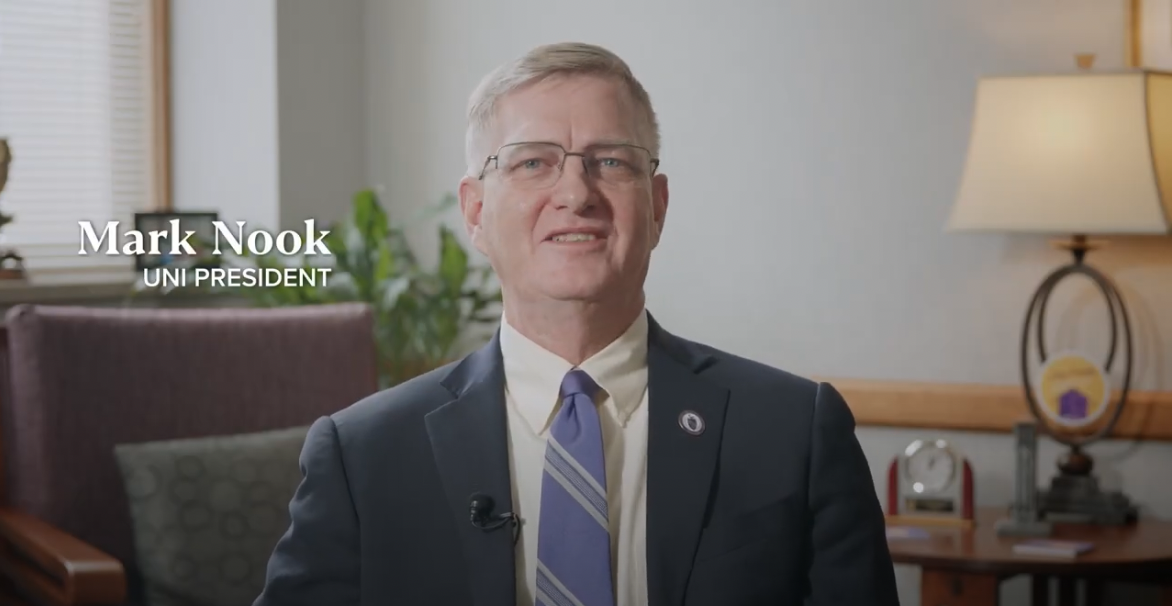Panther Jay Morales, deciding major, is working to capture the essence of the UNI student body with his Facebook page “Students of UNI,” modeled after the popular “Humans of New York” page on Facebook.
For those not familiar with “Humans of New York,” the page is a photo-blog dedicated to providing anonymous, brief profiles of passersby mostly on the streets of New York City. The photographer, Brandon Stanton, posts snapshots of these New Yorkers accompanied by a quotation. These profiles are known for being both light-hearted and fun or even quite serious and incredibly profound.
As for Morales’s vision for his page, he sees it as an illuminated mirror of sorts–capturing the reflections of his fellow UNI students in a positive light.
“Well it’s like this kid walking here [motions to a student passing by]. Who is he? We’re peers with him. We go to the same school. And we don’t have to necessarily be friends with him,” Morales said, “But I think we may as well acknowledge his existence or something.”
For Morales, individual stories are important.
“This guy has a story: what’s he interested in, where’s he from, what does he do, why does he do it? What’s been the biggest thing to ever happen to him in his life? Maybe he is writing some awesome movie right now and we have no idea that he’s going to be huge someday,” Morales said.
The project is a fusion of two passions for Morales: his passion for people and his love of photography.
“I just like taking pictures of people and I wanted a reason to do that. I also just wanted a reason to bring an even more friendly environment to this campus, something to oppose those mean or hateful things posted on [social media sites] such as Yik Yak and the mean or hateful things people tweet about each other on Twitter; it’s just garbage. I just wanted to oppose that and do something that brings us all together.”
The page is still in its infancy–being less than a week old– but the number of “Likes” is growing rapidly, now close to 1,500; a product of students feeling a connection to the stories featured.
One student’s story in particular connected to Morales and to others who liked the page. The story was about a student and her 5th grade cubby buddy, whom she had had a crush on. One day, he took her book back to her cubby and instead of saying “Thank you” she let slip, “I love you.”
Abbi Cobb, history education and sociology major, picked this student’s story as her favorite as well and reflected upon why so many connected to that particular story.
“I think, to some extent, all of us are attracted to that humility because we have that in common whether or not we like to admit it. It’s humanizing,” said Cobb.
Cobb has long been a fan of the “Humans of New York” page and instantly saw a parallel in the more-localized version, the “Students of UNI” page.
“What I like about the “Humans of New York” page… is that New York City has such a huge population and I think it humanizes the people in an area where you can get so caught-up in the busy day-to-day life,” said Cobb.
According to Cobb, we can succumb to the bustle of everyday life even on a relatively small campus such as UNI.
“I think [“Students of UNI”] is a cool thing because I think it seems like we have a big campus–even though it’s smaller than some of the other State campuses– and it just makes it seem smaller when you get to know other people’s stories. Because everybody does have a story after all,” said Cobb.
Cobb’s sentiments largely echo the feedback Morales has been getting thus far.
“There are a lot of people talking about [the page]. I’ve had people come up to me and ask me if I’ve heard of it and that’s great. I haven’t heard anything negative yet so that’s good,” said Morales.
Some of this positive feedback stems from the tenets of Morales’s strategy for approaching those he chooses. He stresses the importance of making the student comfortable and that the image of the student is less important than capturing them as an individual.
“I don’t want it to be plain face shots; I want it to be more than that. People today are hesitant about getting their picture taken, and that’s because of the Internet. People thirty years ago were like, ‘Yeah, sure, hit the shutter, take a picture of me!’ but that’s not the case now. I try to have a positive energy when I approach people to make them comfortable and let them know I’m not crazy [laughs],” Morales said.
There remains one goal for Morales that he hopes to accomplish with this project.
“I ask them about some point in their life, not necessarily to expose that person to the world, but to let the world know that this is a person; who has a story just like you do,” Morales said.









